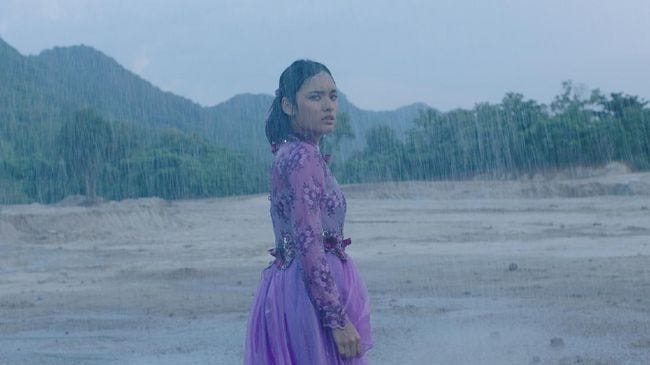Notes on YUNI (Dir: Kamila Andini, 2021)
It has become so unbecoming for me to miss out on a few months of devoting to this newsletter. Work has been very orbitally consuming on my end, both with my main job and freelance works. I miss reading and I miss writing for fun and/or exercise. The amount of unread books and articles on my Pocket are astounding. Even though they are essentially inanimate, there’s a part of me that feels irked, if not embarrassed, for not spending time to devour them.
But above all, I am still enthused with culture even more. All those films and shows and books and articles are met with the kind of childlike eagerness that nobody but me can show. For this new post, I would like to write about two great Indonesian films that have been championing the nation all above that coincidentally talk about sex, repression, and how patriarchy has ruined all of us.
This is part I
Yuni
It was in the opening sequences that the film Yuni manifests itself as the titular character, Yuni; a high school senior on the brink of graduation. She is also a teenage girl brimming with scholarly aptitude and penchant for mischievousness and the color purple. Upon the first meeting of the character, Yuni is seen being scolded by a teacher about her gratuitous tendency to kleptomania, where she’s resorted to stealing her friend’s purple scrunchie. Within those scenes, there lies the phlegmatic tumultuousness that would encompass the film.
Kamila Andini is a force of a filmmaker. With two feature films and two shorts under her belt, she is simply a master in crafting a story so beguiling to the feminine sense. Especially the interiority of women, all the ponderation, desire, loss, trepidation, and all things humane. In her last feature, The Seen & Unseen, a young girl is dealing with the grief of her twin flame, whereas Yuni is a triumph of angst, done beautifully without shedding the complexity of teen girls’ inner turmoil. It touches a nerve between the weight of girlhood, the ruins of Indonesia’s patriarchal system, and a teenage girl, faced by a future so foreboding and inevitable.
Famously, there are two cuts of Yuni out there. There’s the subtle and careful festival version that studies Yuni as the character. And there’s the theatrical version that blares with openness and its consequences. Though both are respectively great in their own ways, the latter conveys urgency since its matter-of-factness is horrifyingly fitting with our current situation on the news with our beloved who have departed and suffered. But what do I care? For these two versions represent the rotten truth where survival is forced to be our sole armor, instead of what was supposed to be a supplementary state of being, an alternative option, a skill.
Aesthetically, what strikes the film the most out of the gate is the color purple — taking the visual lead in almost all of the frames. From Yuni’s backpack to her everyday clothes, all the way to her drink when she was hanging out with her friends. The work that the art director, Budi Riyanto, has done in order to materialize the obsession of Yuni with purple, combined with the benevolently lush cinematography of Teoh Gay Hian; they all serve almost as the genesis of a quiet storm, which is resembled quite beautifully by the leading actress.
Ah, the leading actress… What can be said about the ever-spellbinding Arawinda Kirana? Her commanding presence? Or the charisma she exudes? Or even just about the fact that there is no stopping her performance. In her first feature-length debut as a leading actress, Kirana is able to whisk us into the psyche of an anxious girl waiting for fate to change, somehow. Her eyes inform us the internal conundrums and the relentless inquisitiveness for the unknown. There is a world for her, but it was for her to draw up a map, a plan, and figure out a path to go to. Her desire of another life emerges into something of an abstraction that is hazy, and yet tangible.
Above all, this sordid tale wouldn’t be fully realized into fruition if it wasn’t for the performance of the women. From the schoolgirls who gossip, gush, contemplate, and forever wonder about things that only schoolgirls know how to, even though beneath the jolly exterior of these girls, bleakness loiters; to the ‘free-spirited’ girls at the town mall who each present complexities as the film unravels. As beings, the men in Yuni are merely ornaments. Kind of like Halloween spider web in December; when their presence begins to annoy you, it’s only a matter of time to remove them for your space to exist again. This masculine energy illuminates the problem of said bleakness. They never left, they just haunt.
This is why Yuni is important viewing. It allows us to be a guest in the women’s world and wear their shoes for a change. Yuni pushes us to face reality, to witness Yuni, the character, to be the vessel of insurrection against the demoniac force. Still, while being the whistleblower to the aforementioned rotten truth, Yuni would ask us to be pretty as we dissolve in the perpetual uproar against patriarchy.




